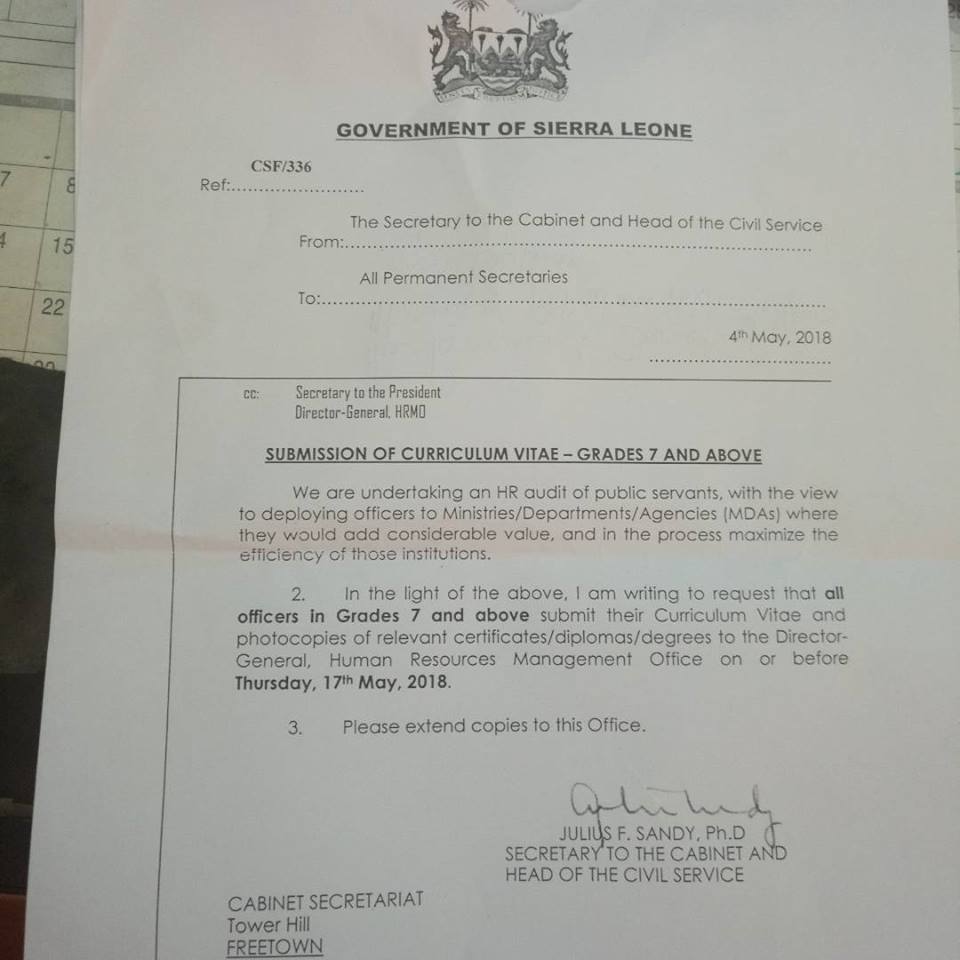
FIXING IT UP
I am happy to have read a Memo from the Head Of Civil Service directing Permanent Secretaries to forward CVs of all Civil Servants of grades 7 and above.
This action, amongst others, is a manifestation that the New Direction is determined to fix things up. “Salone go betteh Ma!”
For quite a long time now, our Civil Service has become a fanfare job of mere occupancy and shadiw boxing. A place where most spend time to warm chairs and sign off registers. It was gradually becoming a template of Inefficiency and bad Management. One caught in a vicious cycle of garbage in and out. Everything was just cooked up against another.
The principal purpose of the civil service is to help in implementing Government policies for development. I cannot overemphasize the importance in the development of a Country especially ours.
In an ideal sense; one expects to see a civil service as the principal hub of every Government. One that is staffed with a competent and well motivated workforce, armed with professionalism and capable of pushing Government policies into meaningful and gainful services for development.
Unfortunately, our Civil Service, for decades, has been plagued by political damaging and bloated with incompetent workforce. It has become a place to “Spare time” or “Count Days” until the next salary drops.
Politicians have had a field day in polarizing the Civil Service. They have distorted every semblance of functionality. Bloating it with party stelwarts, most of whom are bare-Educated. They secure a place for their cronies to past time and get free money albeit on the demerit of incompetence and Party loyalty.
Others have made it a business place; where fuel chits are traded, Utility bills are priced at unmanageable costs. Non existing services are continually paid for and yet we all, at some point, seem mindless about it.
One can therfore not be surprised of how core values of Professionalism, Meritocracy, Neutrality, Accountability and Integrity melted away from the ambits of the Civil Service. It’s a situation of how mediocrity and undue elevation killed the passion to serve by those who have what it takes to do the job. It’s a situation of how greed and Corruption permeated the collars of a fine sector. One where some prefer to be paid in pittance but steal wholly. Have you ever wondered how we have low paid but rich civil servants?. It’s the magical trick Emerson referenced in one of his popular songs.
A Scholar once noted that a “Good Administration is not a luxury but an essential condition for development “. This is why one cannot separate competence and motivation. One is as motivated to serve by his competence based on the reward of merit. We are humans and the urge to manifest excellence is primarily anchored on a solid platform of our competence. The competence matrix puts performance and capacity at equilibrium levels. It’s an easy litmus test; one cannot give what one does not have. The opposite is true.
Now that the Government have decide to overhaul the Civil Service on the basis of competence to increase maximum administrative efficiency; one Will begin to eye the Civil Service with an enviable look. Most importantly is that the Government is fixing one sector that has, for long, being ignored and kept skeletal.
There is a set of qualified people in the civil service whose competences, if placed and utilized appropriately, can trigger maximum efficiency and yield deliverables. I know most and have equally seen them been rendered incapable despite their abilities. Their principal crime was being qualified and refusing to be mediocre. They have been frustrated to a point that they sometimes see their competences as a curse.
The greatest benefactors are those capable, qualified and committed to serve their country without political or tribal alignment. Atleast for a long time again, meritocracy will become the soundbite in Public Service Management. Mediocrity will wane off. This would rehabilitate the mental perception of the Civil Service as a lame duck Institution to a functional Public sector geared towards serving the State
No more should we relegate to a level where someone’s sychophancy becomes a determinant in being elevated to a level they can barely fit or situate.
If Government succeeds in fixing the Civil Service; many things will fall in their original and rightful place. If Government makes it a priority to scan each and every Government institution to ascertain who is doing what and on what competence, then many of our problems in Public institutions would be addressed.
Mediocrity needs a fierce approach to be curbed. No remnants of pale and abstract qualification should stand in place of competence. People must merit what they are entitled to. That’s how they value their worth.
Those who made it a task to rightfully capacitate themselves must realize the worth of their effort which can be translated into motivation and determination to serve.
The will and dedicated to work well does not come by chance. They are grafted by standards of merit. He who is worthy of his/her salt will always strive hard to stand out clean.
When people are put in their appropriate places based on merit, they give their best to work. It builds their self worth and makes them less liable to compromise work ethics
Certainly. The New Direction is taking us to the road not taken and the future looks rosy.
Let everyman be rewarded by the merit of his competence. It’s gonna be tough but that’s how a Country can progress. We must not be derailed.
Salone must be Fixed!.
@Bandajuma.
Victor Ako Mengot to Sierra Leone Parliamentary Watch
Restructuring the Civil Service in Sierra Leone
The Secretary to the Cabinet and Head of the Civil Service is undertaking an HR Audit of public servants with a view of deploying officers to Ministries/Department and Agencies in order to maximize the efficiency of these institutions.
All Officers in Grade 7 (i.e. entry Grade for Graduates) are required to submit their CVs and certified copies of relevant Certificates/Diplomas and Degrees for the purpose assessing their capability to perform their current jobs as well as to decide were they can provide the best services to the employers and the general public.
The role of the Civil Service is to serve the civil society so that ordinary men and women can enjoy the benefits of living in an organised environment. The services provided by the Civil Service are largely public goods – defence and security, law and order, education, healthcare, physical infrastructure, transport, telecommunications, etc.
The Civil Service is also responsible for implementation of the Government’s projects ranging from small to complex ones. But besides making sure that they are carried out as devised, the Civil Service also needs to ensure that they are carried out on time and within the set budget.
In addition to implementing the Government policy, civil servants also offer support and advice on policy making to the Ministers. However, experience shows that very few civil servants are actually active in policy making. At the same time, the level of quality of advice on policy solutions and implementation is not consistent. Civil servants often give advice on the basis of too few evidence and a narrow point of view based on the views of their political patrons.
The present move by the Government to review the jobs and responsibilities of public officers is a step in the right direction. More importantly, it will be of immense benefit to the country and the public at large if consideration should be given to the principles of standards in public life known in the UK as the Nolan Principles. These are as follows:
(1) Selflessness:
Holders of public office should act solely in terms of the public interest. They should not do so in order to gain financial or other benefits for themselves, their family or their friends.
(2) Integrity:
Holders of public office should not place themselves under any financial or other obligation to outside individuals or organisations that might seek to influence them in the performance of their official duties.
(3) Objectivity:
In carrying out public business, including making public appointments, awarding contracts, or recommending individuals for rewards and benefits, holders of public office should make choices on merit.
(4) Accountability:
Holders of public office are accountable for their decisions and actions to the public and must submit themselves to whatever scrutiny is appropriate to their office.
(5) Openness:
Holders of public office should be as open as possible about all the decisions and actions that they take. They should give reasons for their decisions and restrict information only when the wider public interest clearly demands.
(6) Honesty:
Holders of public office have a duty to declare any private interests relating to their public duties and to take steps to resolve any conflicts arising in a way that protects the public interest.
(7) Leadership:
Holders of public office should promote and support these principles by leadership and example.
These principles were established in October 1994 by the Prime Minister, John Major, following a public Inquiry by Lord Justice Nolan and it was a measured response to concerns that the conduct of some politicians was unethical—-for example, during the cash-for-questions affair. It was later extended to cover the activities of all public sector workers.
We hope that after the current review these principles will be included in a revised Code of Ethics for all Cabinet Ministers and Public Servants including the Heads of Departments/Agencies




